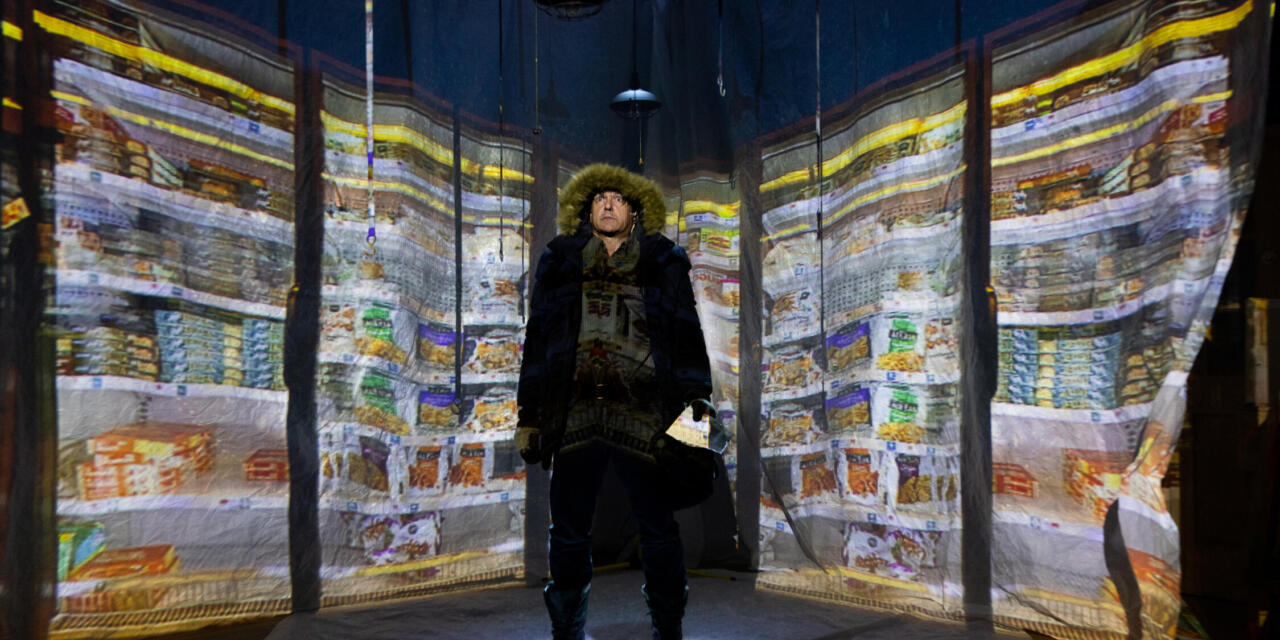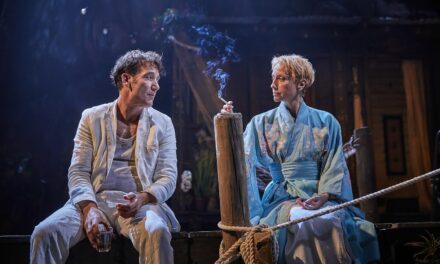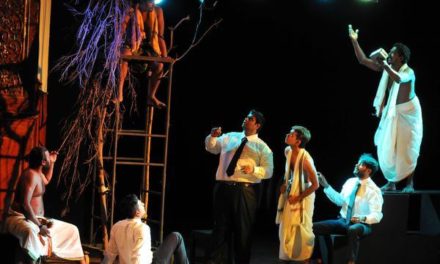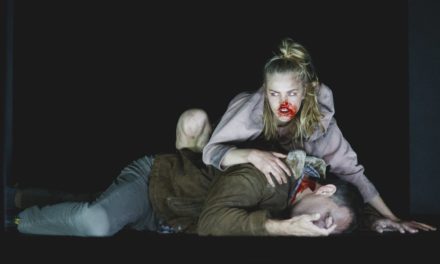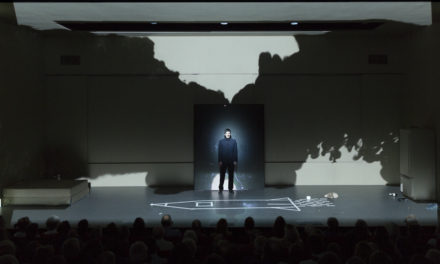It has been so challenging to write these reviews of three recent works presented as part of the Prototype Festival, works, as the founders have said in various ways, that “skirt the line between musical theater and opera.” The difficulty lies between the fact that I am no opera expert and that all three works are complex, innovative, and stunning. How can I do justice to something in which I can only share a novice’s perspective?
Sitting in the audience before recent Prototype Festival offerings, the anticipation of the opera-goers was a living, swirling thing. Imagine what it must have been like when there was a new opera by Mozart – the excitement, the knowledge that as an audience member, you’d be experiencing a performance that few others in the world had ever seen. This similar anticipatory awareness must have contributed to the energy levels. Unlike other theatre events, everyone seemed to know everyone else or at least a great deal of everyone else. Patrons dropped their coats in their seats and then wove their ways to greet patrons. It seemed a tightly-knit conglomeration of opera lovers, composers, librettists, students, and the inevitable critic or two or three. Hard to divine the exact relationship, but it was clear that they were all thrilled and beyond excited to witness the premieres of new works. The only exception was one grump who first complained about his middle-of-the-row seat, asked to be moved, appropriated another couple’s seats, then proceeded to tell his new seatmates that he wished he could leave.
What a shame that he was in such a negative mindset – I can only hope that the performance of Mary Motorhead/Trade (and if he had been in the audience for In Our Daughter’s Eyes) changed his attitude. The works were spectacular in their inventiveness, tenderness, and deep insights into the human condition. All three were experimental and non-traditional operas set in present times, incorporating modern technology (smartphones, for example, in two cases) to drive the stories forward. The music was also contemporary: jangling and harsh at times, discordant, with electric guitars alongside more expected orchestral strings, horns, and percussion. Despite the dissonant timbre of the music, it still perfectly supported the characters’ journeys and storylines. While all three stories could not have been more different, all three very much revealed the interior worlds of their characters, and the suffocating isolation that human beings find themselves in.
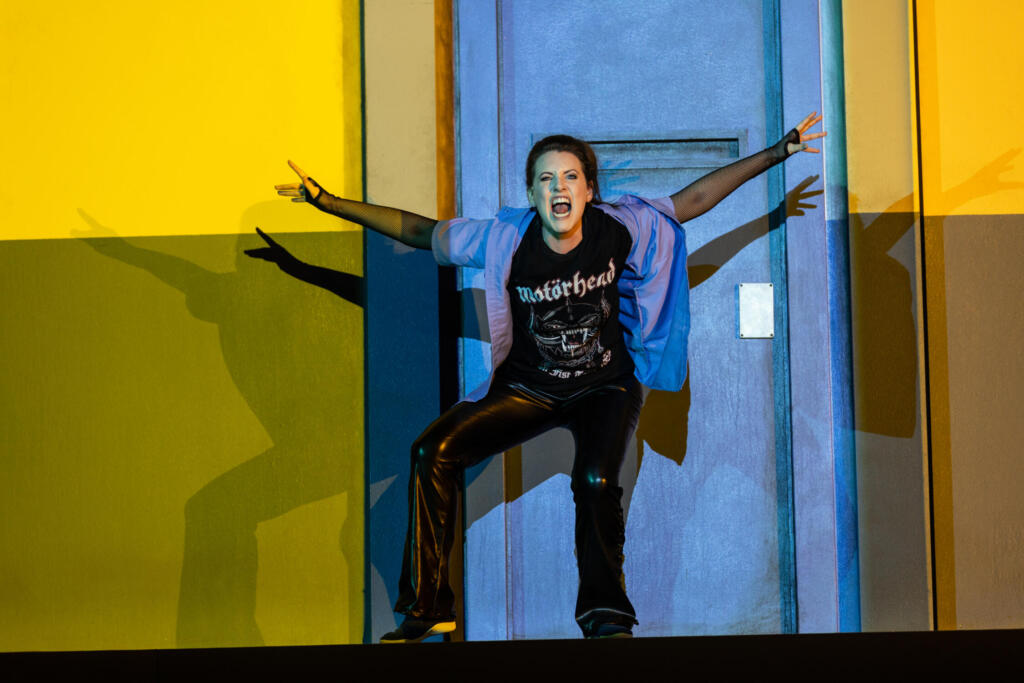
May Motorhead/Trade. Photo credit: Maria Baranova.
Mary Motorhead, the eponymous character played by Naomi Louisa O’Connell, is a soliloquy by a woman prisoner. She begins her story by explaining she has two different definitions of the word history: “BIG history” and “secret history.” Her tale is the secret history of all the lesser events in her life that build into the confessional of who she was and how she ended up as she did. Her origin story is recognizable to anyone who has strained against small-town conformist attitudes. As she grew into her 20s, her rage overflowed against her lack of options leading to her eventual imprisonment. The operetta was only 30 minutes long, but in terms of impact, devastating. Every single moment was a jewel, including the lighting design by Christopher Kuhl. The light that continually shape-shifted around Mary became a character of its own, closing in on her or serving as a representation of her wild nights, or enveloping her in a halo of liquid, warm light as she contemplated her life in quieter moments.
Trade was equally heart-breaking, the story of a closeted, married man, Older Man, visiting his regular male young lover/prostitute, Younger Man, ostensibly for the last time.
Mary Motorhead and Trade were shorter-length operettas and presented together as a double bill. Fortunately, their proximity highlighted the characters’ isolation and introspection. Both Mary and the Older Man, despite being surrounded by other physical beings, are utterly alone. However, they have very disparate reactions to their aloneness. Mary confronts herself, her past, her misdeeds, failings, wants, and desires. She grapples with her flaws, but owns them and stares them in the face. The Older Man can only express himself in half-truths; can only show how much he cares for the Younger Man by proxy of a detailed dream where they can live together in a tender embrace. Mary is in jail and yet can more freely explore the interior depths, while the Older Man can interact with the world, but is only free in a cheap motel room with his true love.
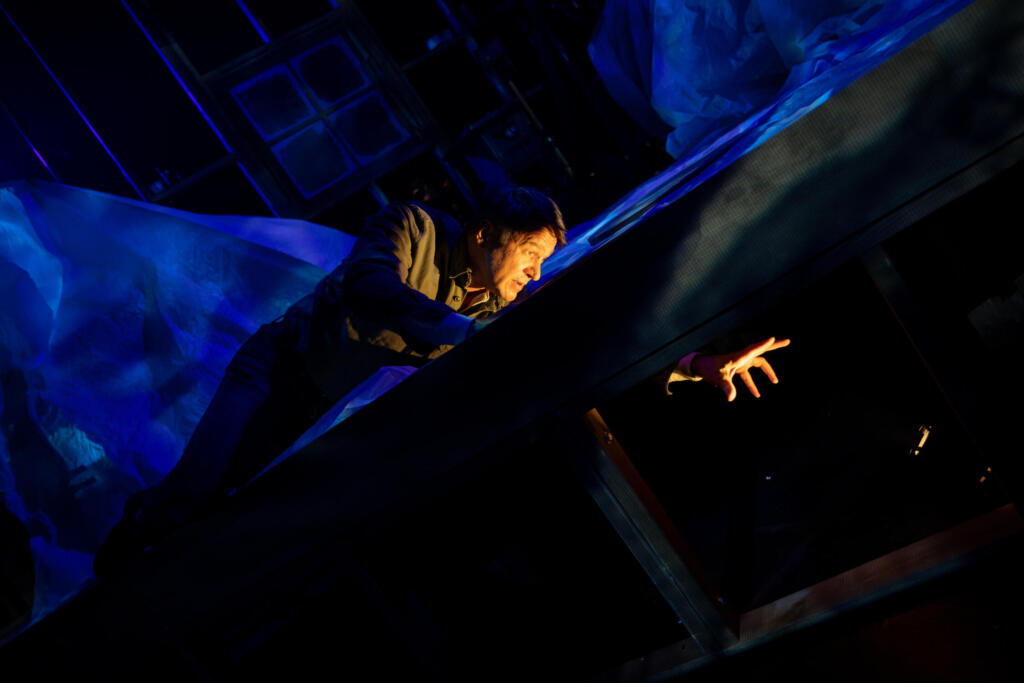
In Our Daughter’s Eyes. Photo credit: Maria Baranova.
In Our Daughter’s Eyes is the story of a man, not quite yet fully a man, at the beginning of an emotional journey. His wife is pregnant with their first child; the setting is his workshop where he builds a crib for his unborn daughter. He also decides to build a written record of what life is like before she is born; he will set down his hopes and dreams for her, planning to share the diary with her when she is older. This is a bildungsroman, and inevitably he is on a difficult journey. His path is winding and tragic; he stumbles and falls prey to interior demons. He travels the path of exteriority through the tunnel of his worst flaws as his world collapses around him. At the end of the performance, when the lights went black, the audience sat in absolute, overwhelmed silence for more than a minute until a lone audience member began to clap, breaking the spell for everyone else.
Very often these days, the death knell of traditional and classical genres is tolled; opera is cited repeatedly as being on the brink. These works spotlight the inaccuracy of these predictions. Growth may not be seen immediately, but with powerful works like these in the Prototype Festival, the seeds of the future have been planted.
The Prototype Festival was founded by Beth Morrison Projects and HERE Arts Center in 2013.
CHAMBER OPERA | WORLD PREMIERE
MARY MOTORHEAD/TRADE
Composed by Emma O’Halloran
Libretto by Mark O’Halloran
Directed by Tom Creed
Music direction by Elaine Kelly
Starring Kyle Bielfield, Marc Kudisch, and Naomi Louisa O’Connell
CHAMBER OPERA | EAST COAST PREMIERE
IN OUR DAUGHTER’S EYES
Composed by Du Yun
Libretto & direction by
Michael Joseph McQuilken
Created with and starring Nathan Gunn
Conducted by Kamna Gupta
This post was written by the author in their personal capacity.The opinions expressed in this article are the author’s own and do not reflect the view of The Theatre Times, their staff or collaborators.
This post was written by Clare Cioffero.
The views expressed here belong to the author and do not necessarily reflect our views and opinions.

